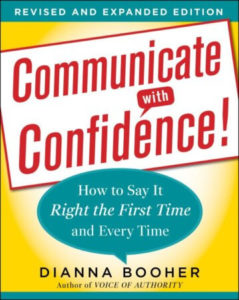
10 Ways to Become a Better Communicator This Year
After coaching senior executives in their communication skills for more than three decades, I’ve observed 10 habits that set the most successful leaders apart from the rest.
These communication behaviors, habits, and styles may help you in the coming year as you strive to inspire your team with a new vision, build stronger loyalty among clients, close bigger deals, find a more appropriate and meaningful career, or even expand your influence in the world at large.
Big goals, right? Well, better communication swings the door wide open.
10 Communication Tips for the New Year
- Successful communicators listen for areas of agreement. Unsuccessful communicators tend to listen for areas of disagreement. Their goal seems to be to broaden a conflict rather than bridge the gap.
- Successful communicators listen all the way to the end. That is, they listen to a complete thought. Less successful colleagues assume they know what a speaker “is driving at” so they interrupt often, talk over the speaker, and consequently miss much of the message.
- Successful communicators practice focused attention. Their less successful coworkers often set themselves up for failure. They become easily distracted with email, texts, or passers-by. As they try to multitask (which, of course, is simply rapid attention switching), their mind wanders off topic—again missing key information.
- Successful communicators take notes on what they read and hear—in meetings, phone calls, podcasts. Their less successful colleagues typically assume they’ll remember what they read, see, or hear, and seldom make notes or recap after the fact. Or if they do make notes, their purpose is often only to refute rather than reflect on the other person’s points or argument.
- Successful communicators ask probing questions to understand the other person’s needs, goals, or concerns about a decision or an agreement. Less successful communicators spend far more conversational time focused on stating their own needs, goals, and concerns rather than trying to understand the other person’s viewpoint and values.
- Successful communicators clarify their understanding of the facts and a situation before drawing conclusions. The less successful jump to conclusions based on assumptions and before gathering sufficient information.
- Successful communicators read body language well. They also acknowledge that they’re listening (with eye contact, facial expressions, note-taking, appropriate follow-up questions). The less experienced communicator pays little attention to body language—his or her own or the other person’s. Weak communicators rely solely on the words spoken, often missing the real message.
- Successful communicators can be comfortable with silence; they listen far more than they talk—especially during negotiations. They know that silence invites other people to speak their mind, to give unsolicited but valuable feedback, to provide hard-to-discover information about themselves and their organization. Unseasoned communicators become rattled with silence; they talk more than they listen, giving away far too much information and failing to gather data and answers they need to negotiate successfully.
- Successful communicators stay calm and controlled even in heated discussions. Their less successful colleagues get agitated in tough discussions and react emotionally. In an emotional outburst (anger or hurt pride or desperation), they make illogical decisions or take short-sighted actions—only to regret the results later.
- Successful communicators identify alignments (acquaintances, partnerships, referrals) to make assessments and look for mutual opportunities in other ventures. Their less successful colleagues either fail to pick up on these tidbits of information or tune them out as irrelevant to the specific discussion at hand. In short, the less seasoned communicators consider day-to-day interactions as transactional conversations. They miss the bigger opportunity to build a relationship for mutual long-term benefit.
A new job, better working conditions, a new partnership, a stronger marriage—consider how better communication can put you on a smoother or more profitable path this year.
Looking for tips on how to improve your online communication? Read my article 18 Ways to Increase Executive Presence in Zoom Meetings at Team Building Hub.
Learn more ways to improve your communication in the new year with Communicate With Confidence!: How to Say It Right the First Time and Every Time.

Get more tips delivered to your inbox, click here to subscribe to Dianna’s ezine.





